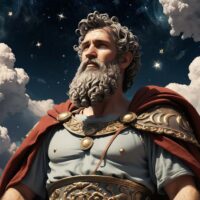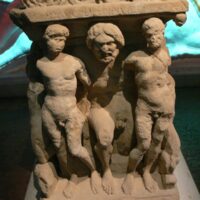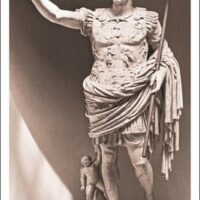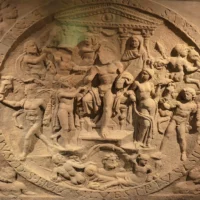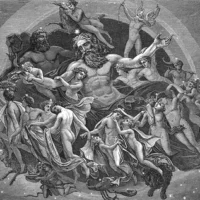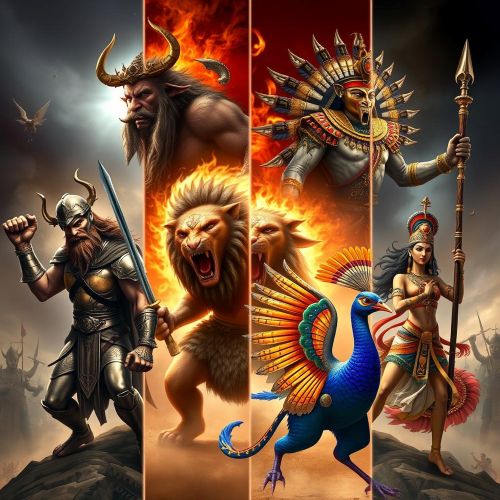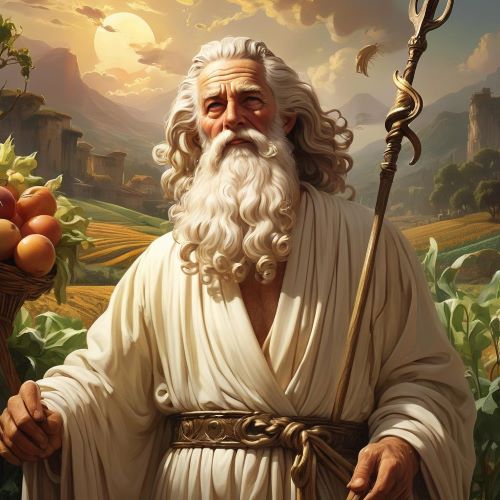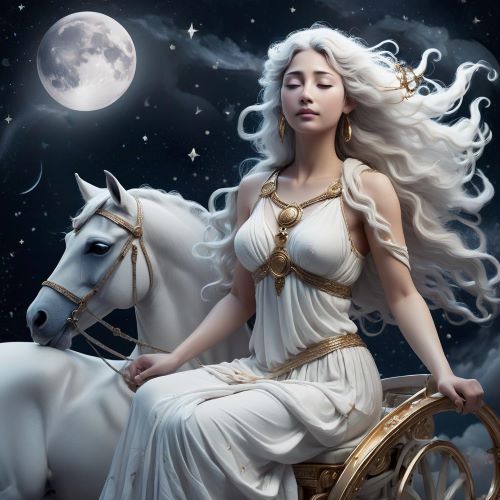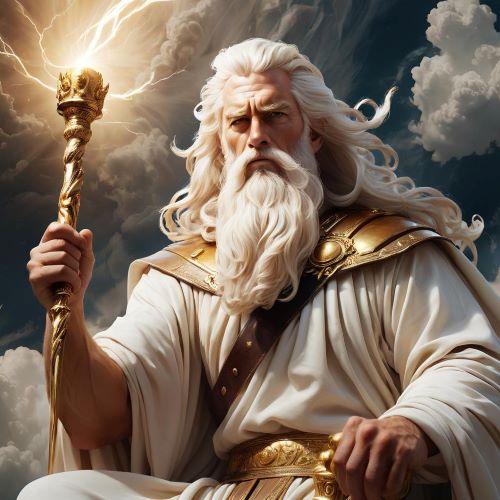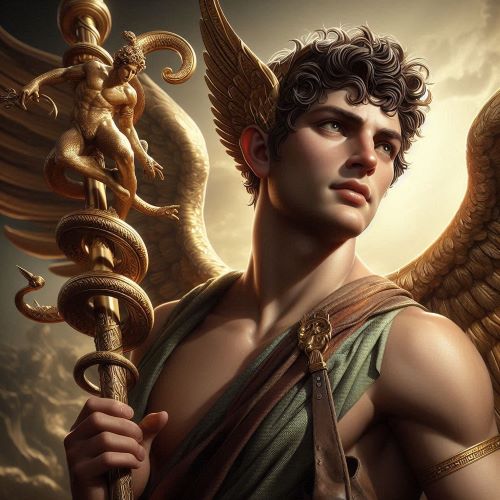Caelus : The Sky God
Listen
At a glance
| Description | |
|---|---|
| Origin | Roman Mythology |
| Classification | Gods |
| Family Members | Aether (Father), Dies (Mother), Terra (Wife), Mercury, Janus, Saturn, and Ops (Children) |
| Region | Italy |
| Associated With | Sky, Clouds |
Caelus
Introduction
Caelus is the primordial Roman deity representing the sky and is often associated with “heaven” or “the heavens.” His name, derived from the Latin word “caelum,” meaning sky or heaven, is the root of many English words related to celestial bodies and the cosmos. Although Caelus played a less prominent role in Roman mythology compared to his Greek counterpart Uranus, his influence on Roman culture and religion is undeniable. As a foundational figure in the Roman pantheon, Caelus symbolizes the vast expanse above and the generative force of the sky. His significance is deeply rooted in the ancient Roman understanding of the cosmos, reflecting early attempts to explain natural phenomena and divine order. As one of the earliest gods, Caelus’ mythological importance is intertwined with the origins of the world and the lineage of other deities, playing a crucial role in the mythological tapestry despite being overshadowed by more prominent figures in Roman and Greek mythologies.
Physical Traits
Caelus, the Roman personification of the sky, is often depicted as a colossal, bearded figure, embodying the vastness and boundlessness of the heavens. His representation often includes a mantle, symbolizing the celestial dome, which underscores his role as the protector and ruler of the skies. Unlike many deities with distinct human-like attributes, Caelus embodies the abstract concept of the heavens. In art and literature, he might appear as a celestial figure with a starry or cloudy appearance, emphasizing his symbolic rather than literal depiction. As a primordial deity, Caelus represents the encompassing vastness of the universe, with his form highlighting the expanse and omnipresence of the sky. His artistic portrayals focus on his symbolic significance, with the mantle as a recurring motif to emphasize his dominion over the celestial realm.
Family
Caelus’ familial connections are intricate and vary across different sources. In some accounts, he is depicted as the offspring of Aether (the upper air) and Dies (Daylight) and is the father of Mercury. Another tradition associates him with Trivia, sharing parentage with Janus and Saturn. However, the most prevalent account identifies Caelus as the consort of Terra (or Tellus), the personification of the Earth. This union symbolizes the primordial duality of sky and earth, foundational to Roman mythological narratives.
Together, Caelus and Terra produced key figures in Roman mythology, including Saturn (equivalent to Cronus in Greek mythology), who is associated with time and harvest and heralded an age of peace and prosperity. Their progeny also include the Titans, Cyclopes, and Hecatoncheires, all significant in mythological stories of divine conflict and power. Caelus’ role in these narratives underscores his importance as one of the earliest Roman deities, embodying the fundamental forces that shape the cosmos.
Other names
In Roman mythology, Caelus, also known as Coelus, derives from the Latin word meaning “sky” or “heaven.” This name highlights his role as the embodiment of the celestial realm enveloping the Earth. Unlike many Roman deities who have numerous titles or regional variations, Caelus is primarily known by these two names. While “Caelus” is the more common designation, “Coelus” serves as an alternative spelling.
In certain contexts, Caelus is linked with Jupiter, particularly in inscriptions referring to him as “Optimus Maximus Caelus Aeternus Iuppiter,” which emphasizes his supreme and eternal nature. Additionally, his connection to the Greek god Uranus illustrates the syncretism between Roman and Greek mythologies.
Powers and Abilities
As a primordial deity, Caelus wields abstract powers that extend over the entire sky, cosmos, and natural order. His primary ability is to encompass and govern the celestial realm, influencing the creation and maintenance of the universe. He has dominion over weather phenomena such as storms, rain, and sunshine, and is associated with celestial events and the movement of heavenly bodies. Caelus’s role includes regulating seasons and cycles of time, emphasizing his integral part in the natural world’s balance.
In mythological narratives, Caelus is often linked to significant cosmic events and the establishment of divine order. His control over celestial phenomena and weather, along with his role in the creation of celestial bodies like the sun, moon, and stars, underscores his comprehensive influence. Additionally, he is seen as a protective figure, safeguarding Earth from cosmic threats. The myth of his castration by Saturn reflects the separation of the heavens from the earth and the establishment of a structured cosmic order.
Modern Day Influence
In contemporary times, Caelus’s influence is subtle but still relevant. His role as a primordial deity reflects early Roman views on the cosmos and the divine, providing insight into ancient religious thought. Although he does not prominently feature in modern popular culture, his legacy persists through the study of Roman mythology and ancient religious practices.
Caelus’s impact is evident in several areas. Linguistically, words like “celestial,” “ceiling,” and “celebrate” are derived from “caelum,” underscoring his lasting presence in language. In astronomy, the study of the sky and celestial bodies has roots in the ancient fascination with Caelus. The concept of a divine sky father or creator, similar to Caelus, is reflected in various religious traditions. In art and literature, depictions of the sky and cosmic themes continue to draw inspiration from his imagery.
Though Caelus may not be as prominent today as deities like Jupiter or Mars, his significance in Roman mythology and the enduring impact of his name and symbolism demonstrate his lasting importance. His representation of the sky and his role in mythological genealogies continue to influence cultural and scholarly explorations of ancient cosmology and divine narratives.
Related Images
Frequently Asked Questions
What is lorem Ipsum?
I am text block. Click edit button to change this text. Lorem ipsum dolor sit amet, consectetur adipiscing elit. Ut elit tellus, luctus nec ullamcorper mattis, pulvinar dapibus leo.
What is lorem Ipsum?
I am text block. Click edit button to change this text. Lorem ipsum dolor sit amet, consectetur adipiscing elit. Ut elit tellus, luctus nec ullamcorper mattis, pulvinar dapibus leo.
What is lorem Ipsum?
I am text block. Click edit button to change this text. Lorem ipsum dolor sit amet, consectetur adipiscing elit. Ut elit tellus, luctus nec ullamcorper mattis, pulvinar dapibus leo.
What is lorem Ipsum?
I am text block. Click edit button to change this text. Lorem ipsum dolor sit amet, consectetur adipiscing elit. Ut elit tellus, luctus nec ullamcorper mattis, pulvinar dapibus leo.
What is lorem Ipsum?
I am text block. Click edit button to change this text. Lorem ipsum dolor sit amet, consectetur adipiscing elit. Ut elit tellus, luctus nec ullamcorper mattis, pulvinar dapibus leo.

